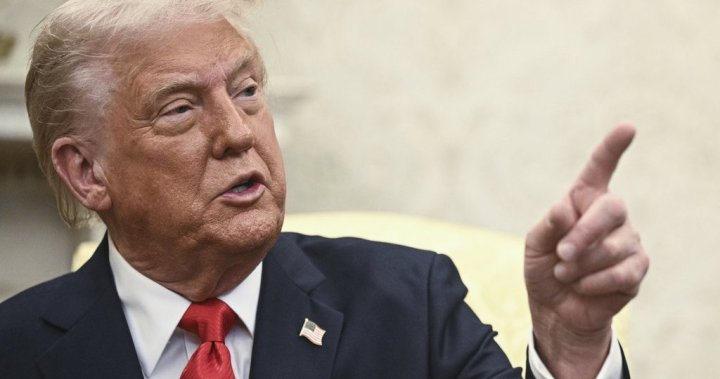U.S. President Donald Trump still wants Canada to become the country’s 51st state, the White House said Friday, a threat he has made repeatedly but had appeared to quiet on in recent weeks.
Trump’s rhetoric toward Canada has appeared to soften since he spoke with Prime Minister Mark Carney last month, although he has occasionally brought up long-standing grievances on trade.
Carney — who is running in the election as leader of the Liberal party but is serving as prime minister in a caretaker capacity — said after the call that Trump “respected Canada’s sovereignty” in his private and public remarks that day.
The countries are set to hold talks after the federal election, which has been dominated by the economic and sovereignty threat posed by the U.S. administration.
Asked Tuesday if there was a reason for the apparent softening of tone, White House press secretary Karoline Leavitt denied there was any change in Trump’s posture behind the scenes.
“I would reject the president’s position on Canada has shifted,” she told reporters.
“The president still maintains his position on Canada: the United States has been subsidizing Canada’s national defence, and he believes that Canadians would benefit greatly from becoming the 51st state of the United States of America.”
After Trump and Carney spoke for the first time on March 28, the U.S. president referred to Carney as “prime minister” — a notable change from his references to former prime minister Justin Trudeau as “governor” of a hypothetical U.S. state.
Trump has not publicly repeated his desire to make Canada a U.S. state since then, after musing about removing the “artificial line” between the two countries in front of NATO Secretary-General Mark Rutte earlier in March.
Get breaking National news
For news impacting Canada and around the world, sign up for breaking news alerts delivered directly to you when they happen.
Carney had warned in the days before that call was scheduled that Trump’s annexation threats would need to stop before Canada agreed to sit down for negotiations on the future of the relationship, including on trade and security.
Federal party leaders have focused their campaigns on the need to shore up Canada’s economy and national defence in the face of U.S. protectionism, including a pivot from reliance on American trade and security.
“The priorities of the United States, once closely aligned to ours, have shifted,” Carney said at a Liberal campaign stop in Dorval, Que., on Monday. “The threats to our sovereignty are multiple.”
Carney has had to pause his election campaign multiple times to lead the federal government’s response to Trump’s ever-evolving trade policies.
On Tuesday, Carney said Trump is “trying to fundamentally restructure the international trading system” through aggressive tariffs on both adversaries and allies, including Canada, which he said needs to “build a new relationship with the United States” while taking a leadership role in the new global economy.
“We cannot control President Trump, but we can control our entire economy,” he told a crowd in St-Eustache, Que.
Conservative Leader Pierre Poilievre said Tuesday at a campaign event in Montreal that Trump “deserves nothing but condemnation for the unfair targeting of Canada” after Trump lifted higher so-called “reciprocal” tariffs on dozens of countries last week but left other tariffs on Canada in place. Sector-specific tariffs on autos, steel and aluminum also remain.
He has argued Liberal policies will continue to drive investment south of the border and make it harder for Canada to decouple itself from the U.S.
“There’s nobody who’s going to be able to control President Trump — as Mr. Carney is learning, despite his promises,” Poilievre said. “What we should do is focus on what we can control.”
At a campaign stop in Toronto on Monday, NDP Leader Jagmeet Singh wouldn’t say if he believes Trump’s rhetoric and actions toward Canada rise to the level of foreign interference.
“What he’s doing is threatening our country,” he said. “He’s threatening our sovereignty, he’s threatening us with economic pressure … and I think that’s a serious concern.”
All three party leaders have repeatedly said Canada will “never” become part of the U.S.
© 2025 Global News, a division of Corus Entertainment Inc.

